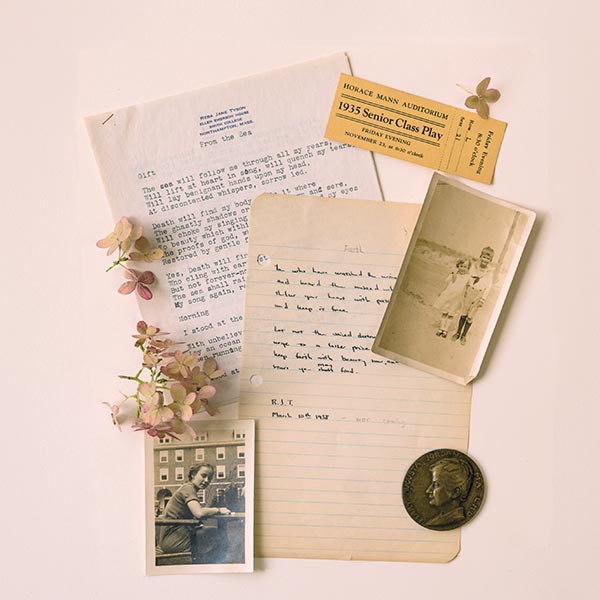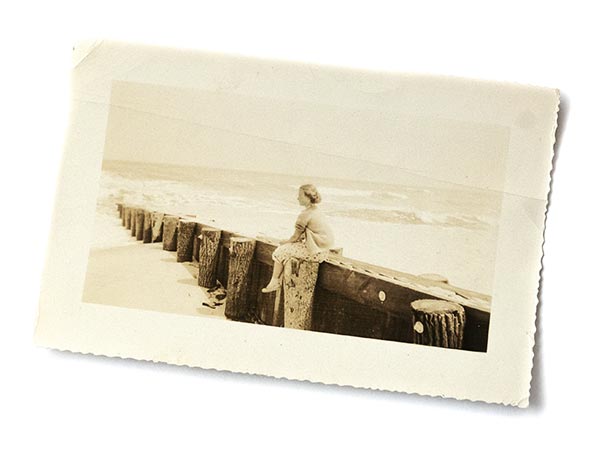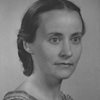Subtotal: $
Checkout
Shelter Your Heart with Patience
A Poet Begins
By Veery Huleatt and Jane Tyson Clement
June 15, 2022
This article is the first chapter of The Heart’s Necessities, which weaves the life and poetry of Jane Tyson Clement together with the music and reflections of singer-songwriter Becca Stevens.
You who have watched the wings of darkness lifting
and heard the misted whisper of the sea,
shelter your heart with patience now, with patience,
and keep it free.
from “Faith,” by Jane Tyson Clement
When Reba Jane Tyson (known as Jane) won the poetry award on graduating from Horace Mann School in 1935, her father took the liberty of sending the prize poem, a lovelorn sonnet beginning “What trace of tears shall I now find …” to several of his colleagues at Columbia University. His pride is evident in the exclamation points that punctuate his observations, but is tempered with fatherly concern: “She’s a queer mixture,” he admits in one letter. “We’re sure we have something in her, but she puzzles us sometimes with her maturity and this queer introspective touch.”
His daughter was puzzled too. Who was Jane Tyson? The question occupied her throughout her early life. The outward details are simple enough to relate: two brothers, Jim older and David younger than herself, a middle-class upbringing near Columbia College, where her father held several administrative positions. The Tysons lived on Claremont Avenue, in the midst of New York’s great educational institutions: Columbia, Barnard College, Julliard School of Music, Union Theological Seminary, International House, and Horace Mann, which Jane attended from first grade through high school. Jane considered the beautiful Columbia campus her backyard, and spent hours playing there with her brothers. Her education included a good dose of New York culture: the Bronx zoo, operas at the Met, and hearing the New York Philharmonic perform under Arturo Toscanini. The family spent summers at their grandparents’ farm in Pennsylvania, and later at Bay Head on the New Jersey coast, where the ocean seized Jane’s heart and imagination. “The sea will follow me through all my years,” she writes in an early poem, and it did: she would still be writing about it in the 1990s.
It was a sheltered childhood, but not completely. Jane was born in 1917, and the shadow of World War I hung over her early years: her father’s closest friend had died in the trenches, and Jane, a sensitive child, observed the pain that war had caused her family and others. This seems to have been the foundation for her lifelong pacifism. Social causes were also close to her heart. Jane’s father was a staunch Democrat – unusual in his milieu – and his father had been a lawyer who never made much because of his habit of representing coal miners and others who couldn’t pay him in full. After the Wall Street Crash of 1929, when Jane was just eleven, she became accustomed to the sight of unemployed men on street corners, selling apples to passersby. Her mother never passed them without buying fruit, which Jane noticed and remembered.

As a teen, Jane became increasingly uncomfortable with the conventional Christianity she observed in the church her family attended. Churchgoers tolerated war, nationalism, racial inequality, and injustice, which Jane could not square with Jesus’ teachings about love and peace, or with her own instincts about the preciousness of life. At seventeen, she announced to her father that she was an agnostic, and quietly stopped attending church. But agnosticism was never a place to stay. It was a way of journeying, of admitting to herself and others that she was on a quest for truth. Jane never doubted that there was something out there far greater than herself. A juvenile poem begins:
I believe in some great god,
Some strange god of the sea,
A laughing god, a mocking god,
A god with peace in his arms,
A gift yet unbestowed.
A god of small moods,
A giver of insights too deep to be touched by words …
Her quest eventually brought her to Riverside Church, led by the famous pastor Harry Emerson Fosdick. Knowing that Fosdick was both a pacifist and deeply concerned about injustice, Jane worked up the courage to ask to meet with him. She remembered later: “I poured out my questions and doubts; he quietly listened and encouraged me to continue my search, to hold on to my belief in peace, and I would find what I was looking for, he was sure of that.”
In the midst of all this, Jane’s talent began to emerge in little poems about nature, her beliefs, creativity, and love. (“But don’t worry,” she noted in the margin of a lovesick poem sent to a friend, “I haven’t depended on anyone so greatly as yet.”) “Have I within myself found restless springs?” she asks in an early poem, and in another, “Why not lay down the power-less pen at last / admit defeat?” She was beginning to think of herself as a poet, but, despite the graduation prize, was also already doubting her creative abilities. “Take back my poet’s soul. I cannot give / Its rich designs a worthy utterance. / Take back my soul, or give me poet’s strength …” The restless springs of creativity and discontent were the source of new questions about the world, about God, and about herself.
High school graduation was soon followed by enrollment in Smith College, in the autumn of 1935. There Jane studied literature and poetry, taking classes with scholars like Charles Jarvis Hill and Howard Patch, and with the poet Grace Hazard Conkling. In 1936, she met the poet Archibald MacLeish, whose famous poem “Ars Poetica,” (the art of poetry) she had probably read and taken to heart: “A poem should be equal to / Not true. … A poem should not mean / But be.” Jane described their encounter in a poem of her own, “To Archibald MacLeish.” While the actual meeting seems to have been a disappointment – “I touched his hand, but he will not remember” – it reveals Jane’s new sense of self and purpose: “I aim to be a poet. That I have over him. / I aim at what he is. The fight is mine.”
At times, her new self-confidence bordered on arrogance. In a letter home to her mother a few months later, Jane wrote: “You ought to get used to different styles of writing. For that reason I am sending home two books I think you would find helpful. … The Hemingway is rather warm and you probably won’t like it but it is a good style to get used to, and a good kind of subject matter to get used to. If you shy away from that sort of thing you lose a lot.” Smith College was transforming an introverted girl into a confident young woman.
Jane’s heart was receiving an education as well. In a comparative religion class she encountered the writings of George Fox, the seventeenth-century reformer and founder of the Quakers (also known as the Society of Friends). No doubt Fox’s vivid, almost poetic prose – “I saw, also, that there was an ocean of darkness and death; but an infinite ocean of light and love, which flowed over the ocean of darkness. In that also I saw the infinite love of God” – attracted her, but it was his honest, uncompromising search for “the faith which purifies and gives victory” that rang true to Jane, and she soon discovered, to her joy, that Quakers still existed – even on the Smith campus.
The Smith College chaplain, Burns Chalmers, was a Quaker, and he and his wife, Elizabeth, hosted open evenings for students. It was at their house that Jane met other students who were part of the peace movement, a loosely defined association that began as a reaction to the atrocities of World War I and continued to be active as a second world war threatened. Jane also began attending Quaker services in a small chapel in the college library.
During Jane’s sophomore year, her father accepted the presidency of Muhlenberg College, in Allentown, Pennsylvania, and the family moved there, away from the Manhattan home of Jane’s childhood. During her senior year, Jane decided to pursue teaching and applied for several positions. Through her new Quaker connections, she was accepted for a teaching internship at Germantown Friends School, at the edge of Philadelphia.
College graduation, like high school commencement four years before, brought with it a literary prize. For her long narrative poem, Strange Dominion, Jane won the Mary Augusta Jordan Prize, awarded for the “best original literary work” of the graduating class. A friend with connections in the publishing world sent the manuscript off to Macmillan while Jane, after a summer at Bay Head, was off to teach school.

A selection of poems from the chapter:
Gift
The sea will follow me through all my years,
will lift my heart in song,
will quench my tears,
will lay benignant hands upon my head
at discontented whispers, sorrow led.
Death will find my body, hide it where
the ghastly shadows creep, all brown and sere;
will choke my singing voice,
will blind my eyes
to beauty which within the seasons lies,
the proofs of God, which fade and rise again,
restored by gentle fingers of His rain.
Yes, Death will find me.
Not immortal, I
who cling with earth-stained fingers
also die –
but not forever – no.
The sea will raise my song again,
remembering all my praise.
1935, Bay Head, New Jersey
To Archibald MacLeish
I touched his hand, but he will not remember.
I looked into his eyes, tea-colored,
and he smiled at me,
not knowing who I was or caring
other than that I was young and just beginning.
He did not know that I stood then
where he once stood,
or that I wanted what he now had found;
will and power of words.
He lays his thoughts
clearly like jewels flashing in the light,
simple, unset except with what the mind
must have to shape itself.
I touched his hand, but he will not remember.
I aim to be a poet. That I have over him.
I aim at what he is. The fight is mine.
He looked as though he knew once what it meant
and had not quite forgotten.
I touched his hand, but he will not remember.
October 15, 1936, Smith College
First Snow
I felt it coming in the thin, blue air.
I saw it in the sky, delaying there,
divinely punctual, for the secret nod
and signal for descent from some snow-god.
I should have known the clouds would waver down
slowly, until they lay upon the ground
and we could walk, feet kicking up the sky
beneath, that once was hanging white and high.
I should have been prepared for this new sight
of something moving downward in the night,
of snow-flame creeping outward on the trees,
and gathering on the roofs, along the eaves,
ticking against the window, flickering by,
or landing on the ledge to melt and die,
holding its pattern for one little space
of time against the wood like fragile lace.
I covered up the flower beds to prepare
for what I knew was near, yet unaware
I let the white drift downward in the still
cold air, to find defeat upon my sill.
1938, Smith College
Foreboding
Across the shallows tawny shadows run
and one grey osprey circles in the sun
over the still, green sea. The moment rests
hot on the sands and on the sunwhite dunes;
the moment is perfection, with the slow
draw of the waves, the gliding of the bird
lonely and silent in the empty air.
It will not last: the osprey will wing off
into the West, the tide will turn, the sky
pile up the clouds, the great grey shadows run
across the sands and shut away the sun.
April 15, 1937; Bay Head
The Brass Locust
So now again the tide wanes and the air
is rich with what would rather be forgotten;
and hard on the moving, on the changing wind
the eternal locust sounds its sharp despair:
the rasp of autumn and the rasp of heat,
metal of prophecy but not of peace,
awl in the ear to make us bondsmen here,
brand in the flesh of mind; under the beat
of sun, of light rain, of the dazzling earth
we lose the visioned, the encompassing eye;
the brass of locust boring in the noon
speaks for the alien and the coming dearth:
the unwise lift their heads, remembering cold,
regathering wisdom, as the sun grows old.
July 31, 1938; Sherman, Connecticut
Faith
You who have watched the wings of darkness lifting
and heard the misted whisper of the sea,
shelter your heart with patience now, with patience,
and keep it free.
Let not the voiced destruction and the tumult
urge to a lesser prize your turning mind;
keep faith with beauty now, and in the ending
stars you may find.
March 10, 1938; Smith College, “war coming”
Now That My Love Has Come
Now that my love has come I see the reason;
now I answer its demand;
it was here always just beyond my vision
waiting for your lifted hand.
It has the width of sea, the depth of shadow;
it holds the storm wind wild and strong,
and light drawn thin to stars in the sweep of heaven
and the prow’s clear water-cleaving song.
1939; from Strange Dominion
Already a subscriber? Sign in
Try 3 months of unlimited access. Start your FREE TRIAL today. Cancel anytime.







